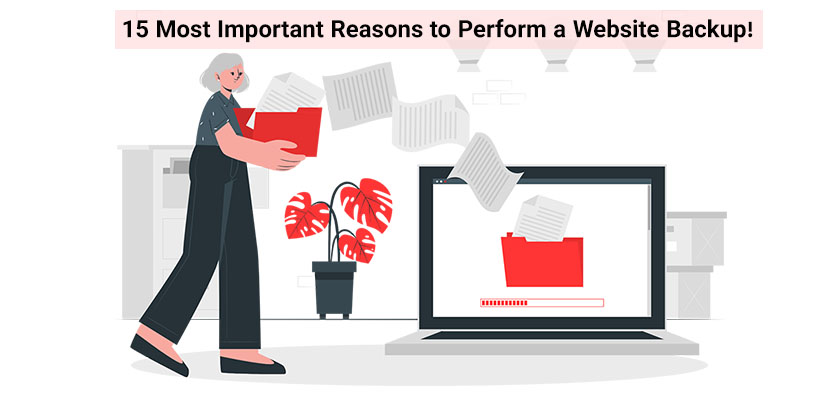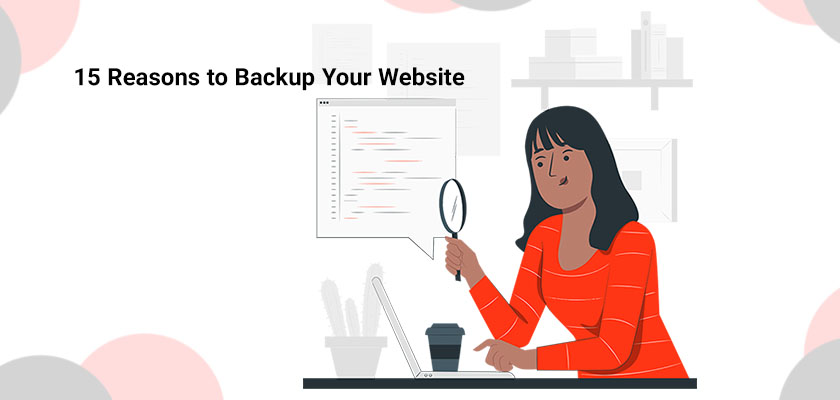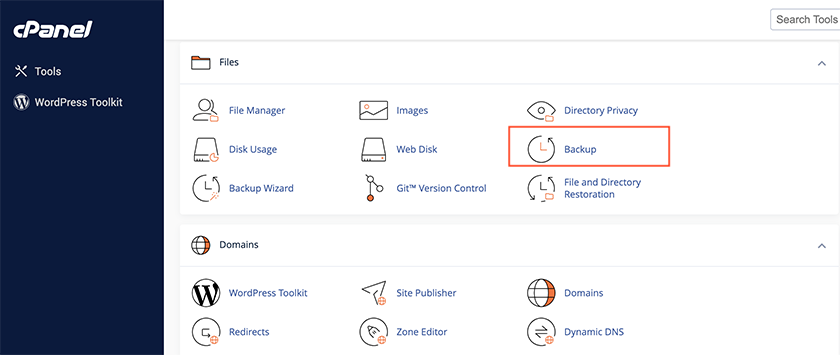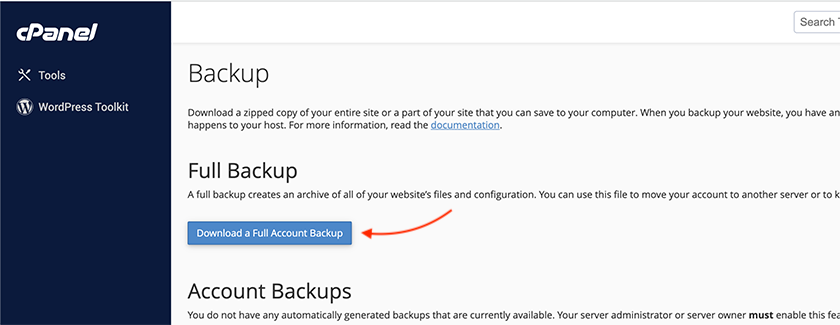
When people select one of the best file shared hosting services, they typically look at the capacity of the disk and monthly traffic speed, mailboxes and so on. When they design a website, they consider the content as well as the structure. While these are crucial to their website presence, there’s a key factor that is often forgotten until it’s too late to backup.
If anything occurs to your site, it is vital to be able to restore it. You could delete something through an error, an update could be faulty, or your site could be hacked or infected with malware. Unfortunately, all of this could occur for any reason. Therefore, you need to be ready at all times. This is exactly when a backup steps in to save the day like a superhero. But what is a website backup? And you may ask yourself, why do I need a website backup? In this article, we’ll go over the basics and why you need to backup your website on a regular basis.
What Is a Website Backup?
A backup of your website is a copy of your website’s data. The details of the backup storage will be determined by the backup service you use online and generally stored on a secure file hosting.
This is especially true for websites that are built on an application that manages content, such as WordPress, which requires the entirety of your website’s media, files, content and databases in order to make it operational once more.
How Often Do You Need to Backup?
There’s no definitive answer to this. If you own an unchanging website that doesn’t frequently update, one backup should be sufficient every month. If you’re running an active website, then you’ll need at least one backup per day to ensure that all the latest updates are stored.
Consider how important your data is and the amount of secure file hosting space you require. Based on these considerations, you should decide on the frequency at which you need to create your backups. In some cases, you will only require just one backup at any given time, but at other times it is more beneficial to have a variety of backups. If your site was compromised in the past, it could have been malicious software within its backups for a time, and the more recent the backup is, the more reliable.
No matter what your backup plan is, regardless of your backup schedule, we suggest backup your website before and after any major update to content or platform update. You can perform website backup on cPanel or other methods, which we’ll explain later. What is a backup in web hosting? Why are backups important? As mentioned before, you have updated your website, and something terrible has happened to your site. With a backup, you can easily restore your website to what it was before the update. You will also have a backup of your site following the update in the event that you require it to ensure that you don’t need to go through the process of updating at a later time.
How Does Website Backup Work?
Backups for your website are guaranteed by a backup service and stored in your file hosting. Backing your website is minimal effort, and many of them make the process automated.
Websites are full of moving elements as well as many files are stored in one of the best file hosting services available, and you may have; for your website to work properly, the server is required to ensure that your website can load correctly. If you don’t back up a vital file, your site could not be able to load correctly. If you’ve ever experimented with the code on your website, you’re likely familiar with the way altering a single line of code can cause your site to go offline. It’s not fun.
If you choose to use an online backup service, you won’t need to think about separate backups for each web element and archiving yourself. The service will do it for you while in the background. This makes sure that every document will be included within the backup, and it is possible to restore your site in just a single click in case it becomes necessary.
Why Do I Need a Website Backup?
Backup your website can be the best way to make sure you’re safe from losing all the efforts you’ve invested in it. Losing your website could result in serious implications.
If you must build an entirely new website, it will take time and expense. It’s not something you can afford to overlook. And if your website has many pages or a live blog, it could be difficult to duplicate some of the content that you’ve put a lot of effort into. A portion of your site could be taken down for good.
If you own an online business, you’re losing money during the time that your website is down. If you’re an online retailer, it can be massive because there will be no way for customers to purchase anything until it is back online. For service providers having a website that isn’t working is, at best, a sign that you’re not professional and may cause you to lose potential customers that cannot find your company while it’s down.
In addition to the costs in terms of time and cost, you must endure the anxiety of embarrassment, anger, and frustration of resolving an unavoidable crisis. The emotional burden that comes with losing your site without backup might be difficult to quantify, but it isn’t to be ignored.
Now let’s discuss 15 reasons why you should backup your website.
15 Reasons to Backup Your Website

Backup services can offer numerous benefits to any business that relies on the internet, as we have mentioned above. It doesn’t matter if you’re starting your own business or have spent a lot of time in the business; there isn’t anything like the benefits of having a reliable backup service. Below are the main reasons that make it crucial to take care of the backup of your website.
1. The Prevention of Data Loss
There is no doubt that this is one of the top motives for getting a backup of your website. This will ensure that you don’t lose important data in any circumstances, as it could be among the most significant threats to your businesses.
2. Security from Hackers
Hackers are always on the lookout to steal your personal information to alter or delete it. A backup of your data for your site gives you the security of not being compromised since you can use the backup of your data to restore your site to the state you were in.
3. A Plan B
The loss of data due to hardware failure is a frequent issue that can be one of the most difficult issues to stop. The software you use cannot overcome this issue without a backup of your website. Thus, it is important to have a backup stored on secure file hosting.
4. Updates Can Pose a Problem
Any update to any software program or application is likely to cause problems (especially if you are using WordPress). This is especially true when there are bugs. Backups are a good alternative to this problem without much effort.
5. Audits and Tax Returns
You may ask, why do I need a website backup for tax returns? Well, tax laws vary between nations, but one thing that is shared is the reputation of the IRS for conducting audits. The data that is stored regarding accounting and financials it’s a good option to avoid having to face it. So if your website goes down for any reason, you have a backup to restore everything and prove your data to such organizations.
6. Virus Infection
The virus and malware could occur at any time and without prior notification. Although it is possible to remove them quickly, the disruption it could cause can affect your business in a significant way. A backup in web hosting of your data will help to make it easier to manage the burden.
7. Client Relationship
The ability to save client data is among the most effective methods to run your company. It could also result in an increase in sales and marketing, aside from helping your business improve its credibility and value in the market.
8. Data Storage
It is possible to keep the information of your valued customers in a secure location that can be accessed for special events and campaigns. Now, imagine the trouble you face if you don’t have any information on some of your best customers.
9. Relations with Investors
The compilation of annual reports for investors can be a lengthy and time-consuming job; however, saving data eases the process in great ways. Since you’ll be able to look at every data of a specific month and add it to your report.
10. Human Errors
Without a doubt, we as humans make mistakes, and the most common mistake we make is deleting important data. But having a well-organized backup system that stores your data on a file hosting can help reduce issues you might have encountered.
11. Archiving
Information backup is a great way to streamline the development of archives. Now you can archive all the information about your business starting from the beginning without difficulties.
12. Reduced Maintenance Time
A reliable data backup system ensures that downtime (in extreme crashes) is minimal and your site is back to normal in a short amount of time.
13. Gain a Competitive Advantage
The practice of backing up important data isn’t common practice in many companies. And some webmasters may even ask their developers what is a backup in web hosting? It will automatically help you gain a competitive advantage and ensure that you do not lose important data under any circumstances while your competition is still trying to figure out the most basic questions.
14. Savings on Resources
Although it could appear you’re spending more on backups, you are actually saving if you look at the long-term perspective. It is expensive to rebuild everything from scratch in the event that an emergency occurs. You can use one of the best file hosting services, which is Cloud-based, to backup your data. There is no need to make additional charges for resources that are not being used.
15. Increased Productivity
Reduced time spent is one of the major advantages of a website backup. Your employees won’t have to search for guides manually. They can quickly access the information they need from their backup and boost their efficiency.
How to Backup Website on cPanel
A lot of web hosting plans come with cPanel. Whether you are using the best WordPress web hosting or a fast VPS server hosting, they both come with cPanel. But just how can you get a backup on cPanel?
- Log into your cPanel account.
- Go to the Files section, then select Backup.

- Click on the link that reads “Download a Full Account Backup”. You can also backup certain sections of your site, in case you’d like to speed up the process.

- Select the location where you’d like your backup to go. Then, enter the address for your email.
Once your backup is completed, you’ll receive an email with your backup’s information under the “Backups Available for Download” section.
How to Backup your Website using CodeGuard
For the first time, you can begin by purchasing CodeGuard. Once you have purchased CodeGuard, the app will start the process of creating backups immediately. Then, CodeGuard will monitor your website on a daily basis and create backups whenever there’s any change.
You can log in to your CodeGuard account anytime to see the status of your most recent backup and also restore your website should you require it.
Conclusion
In this article, we discussed what is a website backup? Why do I need a website backup and much more! If you’ve got an online site that is database driven and you regularly update it or manage the information of customers, you must keep a backup of your website. It’s your choice to decide whether you’ll create one manually from time to time or you will depend on the automated backups that your hosting service creates. The latter is more beneficial since backups are quickly created and won’t take up all the storage space in your account. It is also possible to restore an automated backup in a short time, which will reduce the downtime of your website and also keep data safe from loss and theft.










Leave a Reply